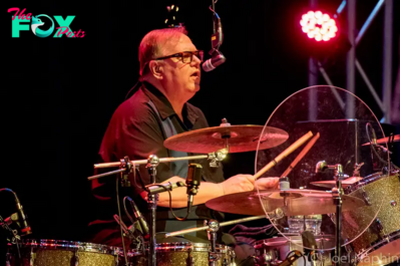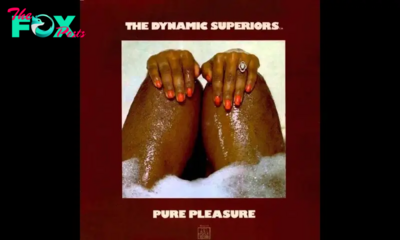Entertainment
AMERICAN THEATRE | SWANA Theatre Deserves Higher Futures
Goodman Theatre’s 2024 manufacturing of Sanaz Toossi’s “English.” (Photograph by Liz Lauren)
In early April, the U.S. Workplace of Administration and Finances revealed the outcomes of a evaluation that put forth the inclusion of “Center Jap and North African” as a brand new racial class within the census. What the U.S. authorities lastly acknowledged with this new field to test is what Southwest Asian and North African (SWANA, the decolonial time period for the Center East/MENA) folks have identified by their lived expertise checking “different” on this nation: Our lives, our tales, are ones of ambiguity and are thus sadly ripe for misrepresentation.
On the subject of artwork and media, the dialog about illustration is commonly framed across the inner impression of seeing oneself represented on the stage or display. In our theatre subject, we’ve seen motion to herald color-conscious casting, particularly for the reason that pandemic, after which identity-conscious casting, most notably in Latinx theatre. However SWANA theatre and its artists haven’t acquired the identical rigor of intervention. A part of the issue stems from most theatres and artists counting on casting pedagogy established nearly three a long time in the past and falling behind {industry} norms for different marginalized teams inside our {industry}.
As an illustration, in a chapter of Casting a Motion: The Welcome Desk Initiative, a seminal textual content on casting revealed in 2019, the founder and former inventive director of California’s Golden Thread Productions, Torange Yeghiazarian, recounts a narrative from 1998: She remembers that her advisor really useful that she forged anybody as Iranian in order that her play might be produced. Accordingly, Yeghiazarian notes, within the Nineties, casting anybody who “appeared” Center Jap was a standard follow.
“That has modified,” Yeghiazarian shared in a current interview. “Individuals are placing extra effort into at the least casting culturally outlined characters from that particular group when potential.”

Some have argued that casting actors primarily based on appears to be like is justified given an absence of SWANA expertise and/or an absence of SWANA actors gifted sufficient to match the ambitions of administrators and playwrights. That is a well-recognized excuse utilized by different theatres within the case of miscasting Latinx and Black characters. Whereas the earlier lack of an official SWANA census class makes it tough to trace the numbers, Chicago, for instance, is a minority-majority metropolis, with an unlimited SWANA presence, together with the most important Palestinian group within the nation, in keeping with the U.S. Census Bureau. (And we solely know that as a result of the knowledge was collected as a write-in; it’s mentioned to be a large underestimation.)
Nonetheless, right here in Chicago we noticed years of productions like Damaged Nostril Theatre’s staging of Jennifer Blackmer’s Human Terrain in 2016 and SWANA playwright Yussef El Guindi’s Language Rooms in 2019, during which South Asian (i.e., Indian or Pakistani) and SWANA actors had been forged interchangeably. Even at Silk Highway Rising (now Silk Highway Cultural Middle, SRCC), an {industry} commonplace-setting group particularly devoted to representing “Pan-Asian, North African, and Muslim experiences…together with their diaspora communities,” we’ve seen a number of productions with non-SWANA actors in SWANA roles, together with for productions like inventive director Jamil Khoury’s 2016 world premiere Mosque Alert. (Khoury declined an interview for this text.) Extra lately, we’ve seen productions of Kareem Fahmy’s A Distinct Society at Writers Theatre and Sylvia Khoury’s Promoting Kabul at Northlight Theatre forged South Asian actors and SWANA actors interchangeably.
Others, together with Yeghiazarian in a current interview, argue that embodying different tales, identities, and lives is a part of the performing job. However assigning SWANA roles primarily based on appearances and restricted cultural context implies that, as an illustration, South Asian actors are sometimes forged as SWANA characters, however, apparently, not within the function of different ethnicities or nationalities they share borders with throughout the broader continent of Asia, together with these of China, Vietnam, and Thailand. The Orientalist notion that sees South Asian and SWANA our bodies as interchangeable is rooted in post-9/11 hysteria and stereotypes we should always work to dismantle. In line with a 2003 report by the U.S. Fee on Civil Rights, the enmeshment of the phrases Arab, South Asian, Muslim, and Sikh in American tradition originates from the usage of these phrases “indiscriminately within the media and in well-liked discourse” following 9/11. A 2011 report by the Division of Justice, Confronting Discrimination within the Submit 9/11 Period, confirms that the majority Individuals are nonetheless unaware of the variations between these teams talked about above a decade later.
As theatrical practices are beginning to shift post-Covid-lockdown, it’s changing into extra clear that casting anybody who “passes” as SWANA really deepens the pipeline downside used to justify the miscasting follow and pushes SWANA actors out of the {industry}, making a endless cycle of misrepresentation.
A part of the issue that fuels this cycle is the lengthy historical past of tales that talk to non-SWANA audiences, with narratives that affirm Orientalist stereotypes, representations that dominate American media and negatively have an effect on public attitudes and coverage assist, and in flip result in real-life discrimination. Theatre scholar and director Ali-Reza Mirsajadi outlines the hurdle as a “fixed rhetoric of anti-Islamic, anti-Muslim, and anti-[SWANA] tropes that correlate any sort of [SWANA] id—not simply ones expressing Politics and resistance, however ones of additionally merely current by a lens of hurt—of being akin to terrorism, or to being aligned with terrorist teams.”

For instance, Blackmer’s Human Terrain, similarly to the Magical Negro trope, tended to make use of “good” SWANA characters to maneuver a sympathetic white lead’s narrative ahead whereas portray them in opposition to the “unHealthy” SWANA characters. This sharp binary between “good” and “unHealthy” robs SWANA of us of nuance. Even after the industry-wide push for fairness for marginalized communities in theatre in 2020, comparable issues come up in Fahmy’s A Distinct Society and Khoury’s Promoting Kabul, productions from SWANA playwrights and administrators that affiliate SWANA id with a noble wrestle and struggling, with the latter together with stereotypical and reductionist (mis)representations, reminiscent of emotional, submissive girls, and offended, aggressive males.
In fact, many tales of SWANA struggling are private and rooted in historical past, and represent a type of illustration that helps some of us really feel seen. Although this could be the case with Fahmy’s and Khoury’s performs as nicely, the extensively disproportionate platforming of trauma tales by predominantly white establishments in our subject is iNFLicting hurt to the SWANA communities and theatremakers. Such narratives constantly normalize our struggling on a mass scale however hardly ever our pleasure. Why would SWANA actors keep in a subject that not solely repeatedly asks them to audition for trauma-ridden, identity-siloed roles, but in addition repeatedly sees these few roles written for them carried out by non-SWANA actors?
SWANA illustration has been so stymied that our personal group members may not be incentivized to create tales that don’t match into the trauma-porn page-to-stage pipeline constructed by the American theatre to permit us a beneficiant crumb of visibility. The place are extra of our SWANA comedies? What about sci-fi SWANA futurism, homicide mysteries, or love tales that don’t must happen throughout a coNFLict to be high-stakes, deeply significant, or universally profound?
As director, playwright, and scholar Malek Najjar outlines in his chapter in Casting a Motion, points that hold SWANA actors out of the {industry} compound as they transfer by their profession. What begins as “challenges these actors face in academia and coaching” are then furthered by “challenges they face as they enter the skilled subject” and magnified within the “state of a subject that accommodates little to no alternatives for these actors.”
Right here we advocate for adopting solution-oriented actions that we consider would transfer SWANA theatre ahead by empowering our group to “take up area, placed on that story that we wish to inform,” as Sahar Assaf, present govt inventive director of Golden Thread, places it. We want tales that humanize SWANA our bodies, not normalize violence in opposition to them. We want crews that create and produce such narratives to incorporate not solely SWANA administrators and playwrights, as has been the case thus far, but in addition actors and technical and artistic employees. Lastly, theatres should join with the communities they’re making an attempt to signify, domesticate expertise, and create a pipeline for sustainable development throughout the SWANA group.

Higher SWANA Futures
What reignites these points for us is the thrill round new SWANA tales that resist such Orientalist traps and, within the phrases of Sahar Assaf, don’t “attempt to clarify ‘us’” to non-SWANA audiences. As performs like Sanaz Toossi’s English, the primary SWANA play to obtain a Pulitzer in 2023, are produced on phases throughout the nation, there is a chance to proper the wrongs of previous makes an attempt to inform SWANA tales with deeper authenticity. As an illustration, English, lately produced on the Goodman Theatre (subsequent touring to the Guthrie Theater), demonstrates hopeful progress in its legacy of SWANA illustration. At this identical Chicago theatre, in 2017 Rohina Malik’s Yasmina’s Necklace had a non-SWANA playwright and director selecting an Americanized pronunciation for the lead character’s title; then, in 2023, Martin Yousif Zebari’s Layalina had a SWANA-led directing crew and SWANA-majority artistic crew (together with a co-author of this piece, Mikhaiel, as dramaturg); and lately English, which has an Iranian director, principal forged, dramaturg (Mikhaiel once more), and costume designer.
English has seemingly maintained its cultural integrity all through its many productions by together with Iranian principal casts and predominantly Iranian or SWANA administrators. We consider the hole between what has all the time been the {industry} commonplace and the brand new pathway English is carving indicators a shift not solely within the SWANA tales we inform—it additionally factors to a change within the methods we inform them and who will get a seat on the desk. Sahar affirms that the “tide shifting” in what narratives are getting produced is “positively there, which is one other alternative for us to maintain pushing.”
Whereas we honor and construct on the work of earlier generations devoted to selling SWANA cultures within the American theatre, we should acknowledge the complexity and variety of SWANA tales and identities and acknowledge that the change will begin from inside our personal group, on interpersonal and institutional ranges.
We provide the next options as a part of the continued dialog round higher SWANA illustration:
- Interrogate unconscious biases past coaching. Prioritize narratives that decenter stereotypical depictions and terrorist themes and refuse to outline the SWANA area and its cultures merely on tragic phrases. This doesn’t imply that artists ought to be restricted by way of their writing; as an alternative, decision-makers ought to diversify their alternative of SWANA performs in dialog with their manufacturing historical past and the monolithic SWANA tales which have dominated American theatre to this point.
- Middle narratives from outdoors the U.S. Ali-Reza Mirsajadi notes that centering narratives from outdoors the nation and from outdoors the English language might render extra numerous tales from the SWANA area. Dedication to translating new work might share “fact and sincerity about what life is like in Lebanon and Iran and Gaza, and many others.,” in an effort to amplify extra tales from SWANA-born playwrights.
- Domesticate identity-conscious practices and forged with cultural competency. These practices ought to exist all through the method of casting actors and hiring designers. Cultural consultants are handiest when they’re listened to, with groups capable of acquire perception into the complexity of SWANA identities, cultures, and histories. In reflecting on course of, Yeghiazarian expressed that being the “solely” within the room is isolating and makes some choices a lot more durable. There are a multiplicity of SWANA identities the world over, and even two artists with the identical background can have differing experiences.
- Domesticate expertise and create a pipeline. In Casting a Motion: The Welcome Desk Initiative, director and dramaturg Courtney Elkin Mohler factors to a mannequin utilized by Native Voices on the Autry to deal with the “pipeline downside,” during which a company creates an incubator or a culturally immersive area that offers younger Native artists “assets to develop their inventive energies inside an organization system that deliberately makes use of and resists the {industry}’s dominant tradition.” There may be such priceless coaching expertise even briefly readings or workshops whereby the identical actors will be handled like cohorts engaged on a number of tales. We observe Mohler’s assertion that investing in artists—SWANA artists on this case—on each stage of manufacturing is crucial to transferring your entire dialog round inclusion ahead.
- Join with the communities you are attempting to signify. When requested what we will do as theatre artists to get SWANA communities to interact with theatre extra, Sahar Assaf asserted that one strategy to break down cultural limitations is to make “theatre with and by them. I’m serious about devised course of. I’m serious about not solely considering of them as shoppers of our artwork, but in addition members in our artwork—like, how can we get them to be with us, to expertise the method and share their tales? I feel the extra we will do this, the extra concerned they’d be, as a result of they’d have an interest to return see a piece that they participated in.” This fashion we will plant the seed for future generations of artists, work towards art-making as a culturally accepted profession possibility, and join with our communities on a deeper stage.
- Put money into and broaden coaching for SWANA artists. Assaf talked about, within the case of Golden Thread’s current manufacturing Drowning in Cairo, that it value an additional $20,000 to fly in actors from out of town—obligatory however tough for a small SWANA theatre firm. On condition that such practices could not all the time be sustainable, we predict it’s essential to shift the {industry}’s perspective from the limiting perception {that a} BFA/MFA in Performing is extra priceless and trains actors higher than casual or trade-school coaching. As an illustration, skilled coaching facilities exist in main cities, like Black Field Performing, and have confirmed to show group members into skilled actors with a tangible course of in three months. A former center faculty trainer in Chicago, Yuchi Chui, is now working as an actor in L.A. after skilled commerce faculty coaching.
- Decide to discovering and hiring SWANA artists. We should launch the internalized perception that there are “not sufficient” actors when there are extra databases (MAAC, BIPOC arts, MENA Theatre Artists, Chi Artist Minority Actor Database, to call a couple of.), artist organizations, and advocacy teams for SWANA actors (and administrators and designers) than ever earlier than.
- Work in true solidarity with fellow BIPOC artists. Whereas we acknowledge that navigating race as a part of your job will be complicated and nuanced for performers, significantly these with multicultural heritage, we additionally acknowledge the circumstances during which they’re fairly clear. Actors who aren’t of the SWANA diaspora should give the identical solidarity given to Asian, Latinx, and Black theatre communities, who set this precedent years prior and refuse to audition for roles written for a group they don’t seem to be part of. There isn’t a longer room for blackface, yellowface, or brownface in our {industry}.
- Be open to a paradigm shift. Permit quite a lot of SWANA views to exist and for the following technology of leaders to problem what has all the time been the norm. In any case, we’re all working towards the identical shared purpose of a greater future for the SWANA communities in American theatre.
- Make area for brand spanking new narratives and new instruments. As Audre Lorde mentioned in her well-known essay, “For the grasp’s instruments won’t ever dismantle the grasp’s home. They could permit us to briefly beat him at his personal recreation, however they are going to by no means allow us to result in real change.” We can’t proceed to do what now we have all the time performed and anticipate progress. It’s time for a similar requirements of anti-racist illustration utilized to different communities to be utilized to SWANA tales as nicely.
Yasmin Zacaria Mikhaiel (she/they) is a Chicago-based dramaturg, arts journalist, and adjunct professor. Be taught extra at yasminzacaria.com and observe them on Twitter @yasminzacaria, a.okay.a. dramaturgically it tracks.
Aycan Akçamete is an Assistant Professor of Efficiency Research on the College of Oregon. Alongside her scholarly pursuits, she works as a contract dramaturg.
Arti Ishak (they/them) is a Chicago-based actor, director, author, and educator working in Theatre/TV/Movie. Be taught extra at artiishak.com or observe their work on socials @artiishak.
Associated
-

 Entertainment1h ago
Entertainment1h agoHow Gladiator II Connects to the Original Gladiator
-

 Entertainment6h ago
Entertainment6h ago3 Completely different Kinds of TV Appearing Roles
-

 Entertainment6h ago
Entertainment6h agoAmerica On CoffeeWe’re simply inviting you to take a timeout into the rhythmic ambiance of our breakfast, brunch and/or espresso alternatives. We’re comfortable everytime you cease by.SYRUPING UP YOUR VERY OWN COFFEE FLAVORS
-

 Entertainment6h ago
Entertainment6h agoMeet Ava, the Golden Tiger Cub in Thailand Set to Be the Next Cute Viral Sensation
-

 Entertainment6h ago
Entertainment6h agoBest Tom Hardy Movies that Are Must-Watch
-

 Entertainment11h ago
Entertainment11h agoThe Smithereens with John Hampson – West Herr Riviera Theatre – North Tonawanda, NY – November 20, 2024
-

 Entertainment17h ago
Entertainment17h agoAmerica On CoffeeWe’re simply inviting you to take a timeout into the rhythmic ambiance of our breakfast, brunch and/or espresso alternatives. We’re comfortable everytime you cease by.Vacation Espresso Cocktail
-

 Entertainment17h ago
Entertainment17h ago12 Methods to Command a Stage

















